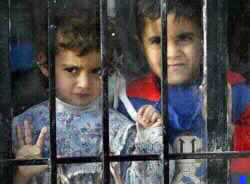The United States said on Monday it expected to deliver a final verdict late this week on Iraq's weapons declaration after warning the dossier was flawed and that Baghdad had no more chances to come clean. The United States and Britain have already signaled that they are preparing to wage war if Iraq breaches a tough U.N. Security Council resolution designed to ensure it has no weapons of mass destruction.
"We'll withhold making a final judgment or final statement until we have completed our analysis, completed our discussions with UNMOVIC (the U.N. arms inspectorate) and IAEA (International Atomic Energy Agency) and our colleagues on the permanent membership of the Security Council," said Secretary of State Colin Powell.
"Then statements will be forthcoming, I expect, toward the end of the week after (UNMOVIC head Hans) Blix makes his presentation to the Security Council on Thursday," Powell told a news conference.
He said Washington had found problems with Iraq's weapons declaration to the United Nations, but did not elaborate.
It was not immediately clear what steps Washington would take after delivering its verdict.
U.S. Deputy Defense Secretary Paul Wolfowitz said earlier this month that the Iraqi declaration to the United Nations on its banned weapons programs would not itself trigger a U.S. decision to go to war.
But the White House said on Monday Iraq would not get a second chance to fill any gaps in its declaration, which was required by the U.N. security Council. Iraq denies having weapons of mass destruction.
"I think it was abundantly plain from the will of the United Nations -- this was Iraq's last chance to inform the world in an accurate, complete and full way what weapons of mass destruction they possessed," White House spokesman Ari Fleischer said.
British officials were quoted as saying they were "very disappointed" by Baghdad's 12,000-page dossier on its chemical, biological, nuclear and missile programs, handed over to the United Nations earlier this month.
U.N. officials have also said Iraq's declaration fails to account for all of its chemical and biological agents. A U.N. resolution in November warned Iraq of "serious consequences" if it failed to comply with U.N. disarmament demands.
BLAIR WARNS IRAQ
British Prime Minister Tony Blair, Washington's staunchest ally over Iraq, said Baghdad could still avoid war but warned that "action should follow" if it breached the U.N. Security Council resolution.
"Sometimes the only way of avoiding war is to be clear that you are prepared to use force," Blair wrote in Britain's Financial Times newspaper.
As U.N. weapons inspectors searched more sites in Iraq, Syria's President Bashar al-Assad said he was optimistic about a peaceful solution and that anyone seeking war with Iraq for the sake of war was "psychologically ill."
Assad, on a landmark first official visit to Britain by a Syrian leader, said Iraq was cooperating with the inspectors.
But Blair made clear at a joint news conference with Assad that they did not agree on how to deal with Iraq. Syria was a key partner in the U.S.-led coalition against Iraq in the 1991 Gulf War to eject Iraqi occupation forces from Kuwait.
U.S. and British warplanes attacked air defenses in southern Iraq for a third successive day in response to attempts to shoot down planes policing a "no-fly" zone, the U.S. military said.
In Baghdad, an Iraqi military spokesman, quoted by the Iraqi News Agency, said U.S. and British planes had attacked civilian installations in the southern province of Dhi Qar. Iraqi anti- aircraft and missile batteries fired back.
Tit-for-tat exchanges in no-fly zones over both northern and southern Iraq have gone on since the Gulf War in 1991 but have increased sharply since mid-year.
Iraq does not recognize the no-fly zones, set up by Western forces after the Gulf War with the stated aim of protecting a Kurdish enclave in the north and Shi'ite Muslims in the south from possible attack by Iraqi forces.
TURKEY PREPARES AS UN INSPECTORS SEARCH 12 IRAQI SITES
In Turkey, a senior military official said Ankara had deployed troops and engineers near its border with northern Iraq to prepare for any U.S.-led attack on Baghdad. He gave no figures but local sources put it at 10,000-15,000 troops.
U.N. arms inspectors searched 12 sites in Iraq on Monday, U.N. officials said. The inspectors have so far reported nothing untoward since they returned to Iraq last month after a four-year absence.
Among the sites visited were the Institute for Biotechnology and Genetic Engineering within the Baghdad University complex and the Al Amiriya Serum and Vaccine Institute in the capital.
Iraqi opposition leaders meeting in London satisfied a U.S. desire for a show of unity, but failed to elect a leader.
The three-day meeting ended with the formation of a 50-member "follow-up committee," opposition sources said.
The six groups are: the Iraqi National Congress -- the most pro-U.S. group led by former banker Ahmad Chalabi, the Tehran-based Supreme Council of Islamic Revolution in Iraq, the Kurdistan Democratic Party, the Patriotic Union of Kurdistan, some former members of Saddam's Ba'ath party, and a Sunni Monarchist movement.
PHOTO CAPTION
Iraqi children look through the window of their house as United Nations arms inspectors search the nearby al-Sawari facility in al Taji, north of Baghdad, December 16, 2002.. (Suhaib Salem/Reuters)
- Author:
& News Agencies - Section:
WORLD HEADLINES


 Home
Home Discover Islam
Discover Islam Quran Recitations
Quran Recitations Lectures
Lectures
 Fatwa
Fatwa Articles
Articles Fiqh
Fiqh E-Books
E-Books Boys & Girls
Boys & Girls  Hajj Rulings
Hajj Rulings Hajj Fatwas
Hajj Fatwas














